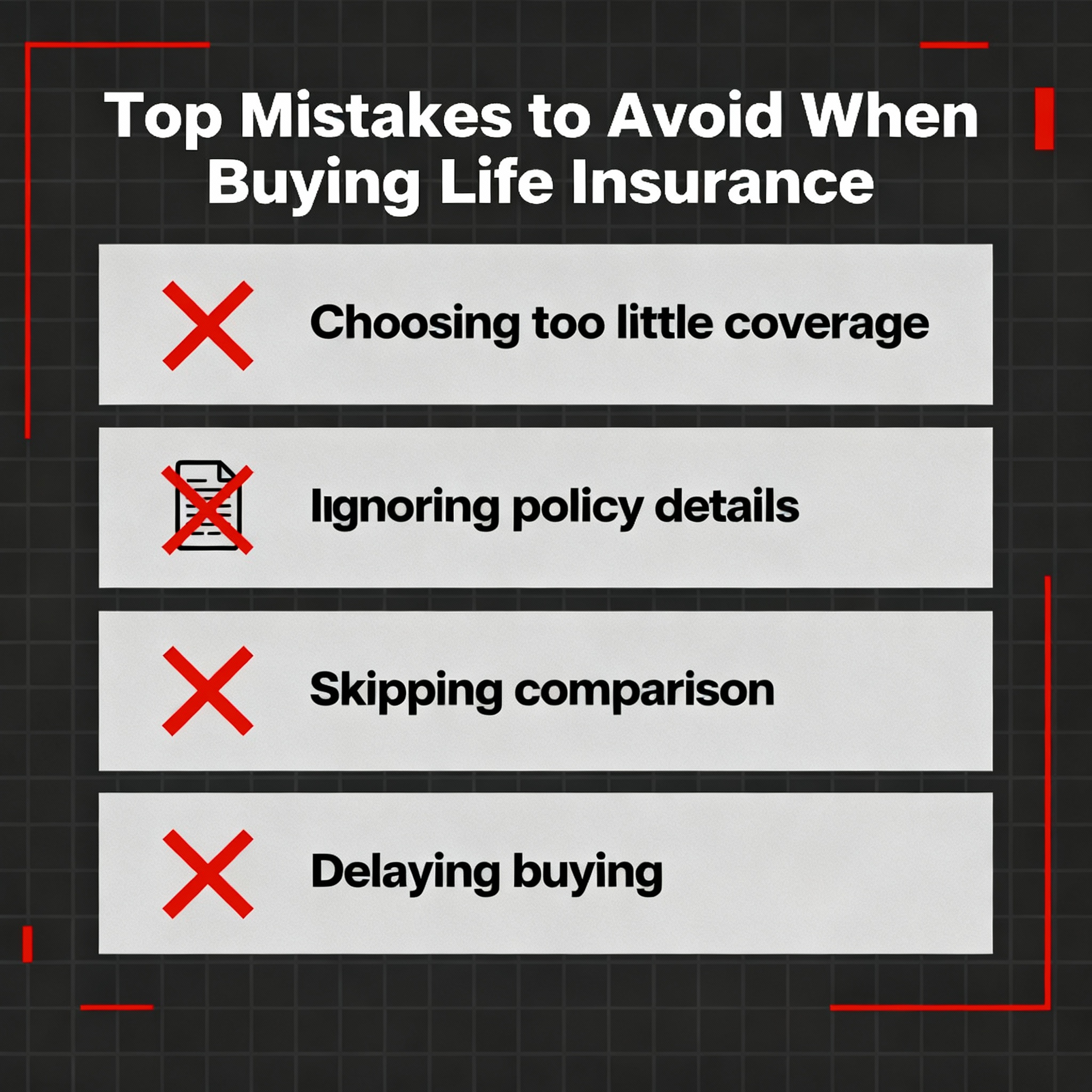Updated: June 2025
Life insurance is one of the critical decisions which you can take to guarantee that your loved ones are catered for financially. Nonetheless, Many people buy it in a hurry or ignore a couple of the most important aspects, which often results in costly mistakes that defeat the purpose of having coverage.
As a first-time buyer or someone updating an existing policy, this is a list of the most common errors to steer clear of so that you select the best insurance for your future and that of your family.
❌ 1. Waiting Too Long to Buy
The younger and the healthier you are, the cheaper your life insurance premium will be. Nevertheless, many people push the purchase of it until the occasion of a “major life event” — marriage, kids, or a mortgage. However, at that point, your age will have gone up, and so will your premiums or even worse, you may have developed health.
Pro Tip: Get the insurance earlier — buying a small term policy in your 20s can lock in the lowest rates for life.
❌ 2. Relying Only on Employer Coverage
Although the insurance cover that employers offer is a good thing, it is not enough. Most group plans offer 1–2x your salary — far below what your family would need to cover expenses, debts, or college tuition.
Pro Tip: Use work coverage as a supplement. Get a private policy for better coverage and portability if you switch jobs.
❌ 3. Underestimating How Much Coverage You Need
Many people base the number they choose on their own feelings about what sounds right without doing any real sums. Leaving out the reality that your real financial needs will be unprotected in the long run.
Common costs to be included:
- Mortgage or rent
- Childcare and education
- Corporate Loan
- Debts
- Care for an unmarried family member
- Daily living costs
- Very large amount of debt
- Costs made for a funeral
Pro Tip: A safe and sound way is to set aside 10–15 times your regular salary.
❌ 4. Choosing the Wrong Type of Policy
Would a whole life insurance policy really be the most suitable option in your case, or might a less costly term life insurance be sufficient?
Term Life: Cheap and best for most people, especially for families.
Whole Life: More costly but it has the advantage of including something in addition to saving/investment.
Universal Life: A feature of flexibility but at the same time it has complex points; it has no attraction for novices.
Pro Tip: Term life usually will be enough for most. Whole life is preferred by the ones with high salaries or who are in the estate planning process.
❌ 5. Not Comparing Quotes from Multiple Providers
A lot of people will choose the insurer who is the first on the list or will go for the one whose ads are shown on TV. However, insurers’ pricing and the content of policies differ from one company to the next very much.
Pro Tip: Make use of the online platforms such as Policygenius, Quotacy, or Ladder to make sure that you get the best policy for your needs.
❌ 6. Naming the Wrong Beneficiary
Incidents like these, where beneficiaries were named wrongly or were not updated, are the ones that can cause legal matters to arise, create delays, or might even lead to wrong individuals being paid.
Example:
- Not deleting a former partner from the list
- Not naming a second recipient (contingent)
- Naming of a minor without a trust or a guardian
Pro Tip: It is the best practice to check your beneficiary records and keep them updated after the crucial stages of your life.
❌ 7. Hiding Health Info During the Application
Certain individuals see the possibility of having premium payments reduced if they do not reveal the existence of health problems or their addiction to tobacco, or their surgeries in the past.
Pro Tip: We admit it. Insurers double-check your health record using medical records and check-ups.
❌ 8. Neglecting Your Policy’s Regular Inspection
New incidents are easily occurred which include new marriages, new borns, mortgages, employment. If you do not update your policy, it might no longer be correct or enough.
Pro Tip: Examine your policy every 2–3 years at least or better still do it after making any major life change.
